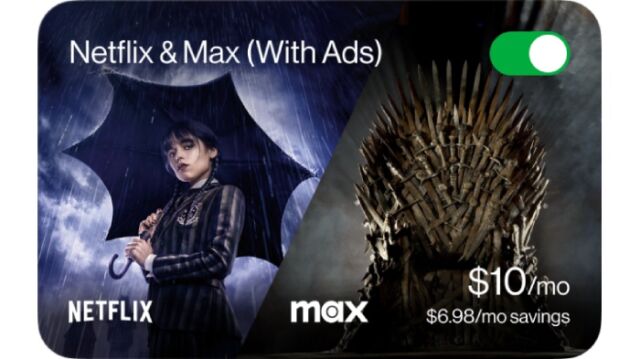Reliably good prices, libraries, and features would impress customers more.

Streaming services are on thin ice with many customers. With price hikes becoming a norm for streaming services, subscribers are reconsidering the value of streaming apps and whether subscriptions are worth the cost. In a bid to mollify disgruntled customers and make their packages seem more economical and simple, streaming services are bundling up.
Verizon announced today that its myPlan wireless phone customers will be able to get Netflix and Max, both with ads, for $10 per month total per phone line. Netflix with ads is usually $6.99 per month, while Max’s ad tier is $9.99 per month or $99.99 per year. That means Verizon customers can save up to $6.98 per month with the new bundle, which Verizon will begin offering on December 7.
The new offer joins two other deals that Verizon already offers that bundle its wireless service with TV streaming. One lets customers add ad-free Disney+ and Hulu and ESPN with ads for $10 per month per line. Another lets customers add Apple One, which includes Apple TV+, Apple Music, Apple Arcade, and iCloud+, for $10 per month per line.
Verizon’s announcement noted that it’s the first wireless provider to bundle ad-laden Netflix and Max and that it’s “using its strategic relationships with the biggest players in the content industry to continue to unlock more value for its wireless customers.” The sentiment echos growing interest in seeing TV-streaming services bundled with other subscription services and/or other TV-streaming services.
On December 1, The Wall Street Journal reported that there may soon be some sort of Apple TV+ and Paramount+ bundle. It’s unclear how that deal would form and whether it would leverage a third party like Verizon. Citing anonymous sources, WSJ said it is “familiar with the discussions,” and that talks are in “early stages.”Advertisement
Bundling up

A Netflix-Max bundle through Verizon and a potential bundle with Apple TV+ and Paramount+ follow a trend that sees streaming apps partnering with other apps (including rivals) and other types of companies with subscription-based revenue to ultimately offer TV streaming at a lower monthly price.
ADVERTISING
Similarly to Verizon, T-Mobile offers bundles for its mobile services with Netflix and Apple TV+. You can get Disney+ with Hulu and ESPN, and Disney, which will soon own all of Hulu, is launching a unified Disney+ and Hulu app. HBO’s Max and Discovery+ merged into Max. Paramount+ offers Showtime content, and Showtime’s Anytime app (for people subscribed to Showtime via a TV provider) is shutting down on December 14. Other streaming-related bundle deals currently being pushed include Paramount+ with Walmart+ and Peacock with Instacart+ or Xfinity.
Striking a deal between multiple conglomerates is complex, though. Companies see less revenue per user when adding customers through promotions and bundles compared to direct sales, WSJ reported in October 2022. Involved companies need to agree on how to divide monthly subscription fees, customer data, and advertising sales. As a result, “such talks in the industry have progressed slowly,” The Washington Post reported at the time.
But over a year after WSJ’s report, streaming bundles are happening “faster than we thought” and are “here to stay,” Erin McPherson, senior vice president and chief content officer at Verizon Communications, said, according to WSJ’s report Friday. Verizon’s CEO, Hans Vestberg, added at a UBS conference today that creating new types of bundles is a company priority, as per The Hollywood Reporter.
ARS VIDEO
How The Callisto Protocol’s Team Designed Its Terrifying, Immersive Audio
The pros and cons of bundled services
Streaming apps have pushed customers to the brink with high prices and complexity. Bundled services offer streaming users more simplicity and a way to streamline the numerous subscriptions they juggle.
Streaming companies also have reason to believe that bundles will keep customers from canceling subscriptions.
Antenna data cited by WSJ on Friday found that customers are less likely to cancel a subscription if it’s bundled into a package with other services. For example, Apple One has “a far-lower churn rate than the stand-alone Apple TV+,” WSJ said, citing Antenna data.
Bundles like the one Verizon just announced can also encourage customers to opt for TV-streaming companies’ ad tiers, which some streaming companies have said bring them a higher average revenue per user than ad-free subscriptions.
Yet, a streaming app bundled with another service you may or may not need doesn’t erase the fact that streaming services have been jacking up prices. If streaming companies are worried about keeping customers, more focus could be put on lower prices and reliably good libraries. Bundling streaming apps together can be economical, but it can also result in people paying for stuff they don’t really watch, which sounds an awful lot like cable TV.
Despite the similarities, though, streaming is set to be the future, leaving many media companies looking to plant their flag in the industry. But it’s possible that there won’t be enough room for everyone in the long run, especially if customer disillusionment with the suddenly crowded space isn’t more thoroughly and rapidly addressed.
As Rich Greenfield, an analyst at media research firm LightShed Partners, told Fortune last month, bundling apps “doesn’t fix the problem” of how to make a successful TV-streaming business. Streaming companies may not lower prices to what they were, but they could earn their prices with improved libraries and feature sets. In some cases, streaming companies have exhibited an opposing approach.
“The macro, high-level view is that there are too many streaming services losing too much money, and someone is going to raise the white flag,” Greenfield said.




